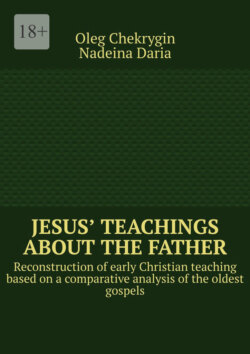Читать книгу Jesus’ Teachings about the Father. Reconstruction of early Christian teaching based on a comparative analysis of the oldest gospels - - Страница 15
“Reconstruction of early Christian teaching based on a comparative analysis of the oldest gospels”
Gospel of John, Analysis
John, chapter 8
ОглавлениеThis chapter is interesting in that it continues and maintains the line of Jesus’ stay in Jerusalem alone, without disciples, “as if in secret.”
It starts strangely – everyone went home, and Jesus went to spend the night on the Mount of Olives – he didn’t find a place in the city, or what? And in the morning he was again in the temple to preach to the Jews again. And then – an episode of an event about a woman taken in adultery, clearly inserted here, as a separate entry about a real event to revive the text, so that the endless strife of Jesus with the Jews does not look deliberately mournful, an imaginary dialogue in details that simply could not be literally remembered for thirty-fifty-seventy years after the evangelical events. We will not analyze this story in detail, it has nothing to do with the main line of the narrative, and therefore we will immediately move on to verse 12 and beyond. I will just note that this scene was most likely taken and borrowed from the “gospel of the Jews”.
“Again therefore Jesus spake unto them, saying, I am the light of the world: he that followeth me shall not walk in the darkness, but shall have the light of life.”– such a call, similar to self-promotion, to beleive Jesus’ word, that you urgently need to sign up to him as a disciple, a kind of recruitment of followers. Further from 13 to 18 again there is an altercation of “Jesus with the Jews” about whether it is possible to believe Jesus, is Jesus true or not. But what the speech is about, what kind of truth – the parties are silent. The mention of the Father as a witness to the truth of Jesus looks, to put it mildly, unconvincing.
“8:19They said therefore unto him, Where is thy Father? Jesus answered, Ye know neither me, nor my Father: if ye knew me, ye would know my Father also. 8:20These words spake he in the treasury, as he taught in the temple: and no man took him; because his hour was not yet come. 8:21He said therefore again unto them, I go away, and ye shall seek me, and shall die in your sin: whither I go, ye cannot come. 8:22The Jews therefore said, Will he kill himself, that he saith, Whither I go, ye cannot come? 8:23And he said unto them, Ye are from beneath; I am from above: ye are of this world; I am not of this world. 8:24I said therefore unto you, that ye shall die in your sins: for except ye believe that I am he, ye shall die in your sins.” – what is this about, who can understand this, and why is it said? You might think that Jesus is deliberately teasing the audience, carrying some kind of absurdity about himself and his own father, unknown to anyone, like Himself. The reaction to these speeches is just quite predictable – bewilderment. In general, Jesus has not yet said essentially anything that could form an idea of His Teachings – and why, then, all this sermon – to deliberately tease in order to run into murder?
